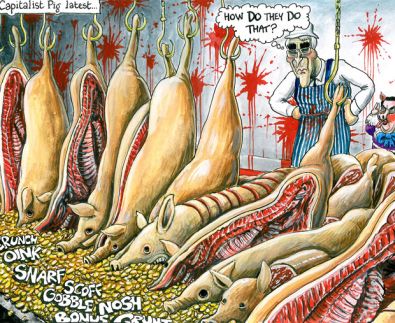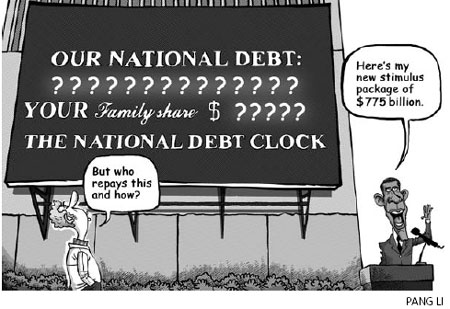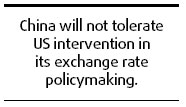
'CAPITALIST
PIGS: THE LATEST'
[Guardian
Unlimited, U.K.]
The China Daily, People's
Republic of China
China 'Will Not Tolerate' U.S. Exchange Rate Threats
Is a trade war about to brake out
between the United States and the People's Republic of China? U.S. talk of
Chinese currency manipulation has raised hackles in Beijing, and they have
responded. This article from China's strictly-controlled China Daily
might be summarized this way: "You [the U.S.] had better not start a trade
war - but if you do, America will be hurt more than China will." Or in the
words of Deng Yuwen, the author of this article:
"China and the United States are about to enter a trade war ... China will not tolerate American
intervention in its exchange rate policymaking, which is within the
jurisdiction of the nation's sovereignty. … As the largest American creditor,
China is estimated to hold 35.4 percent of all U.S. government bonds. Even now,
when its own economy is suffering severe hardship and a serious lack of
fluidity, China has chosen to refrain from selling U.S. national debt. …
the exclusion of Chinese products from the U.S. market wouldn’t severely impact the foundation of the Chinese economy, since the U.S. only accounts for 20 percent of the Chinese export volume. Meanwhile, China is trying to develop a more domestically-driven economy."
By Deng Yuwen*
February 6, 2009
People's
Republic of China - China Daily - Original Article (English)
Just as the world desperately
needs a concerted effort to tackle the escalating financial crisis, there is
growing concern within the international community that China and the United
States are about to enter a trade war.
In a Congressional hearing
before he took office, U.S. Treasury Secretary Timothy Geithner accused China
of currency manipulation. To calm official and academic refutations from the
Chinese side, the White House later explained that its policy on China's
exchange rate is still being studied and yet to be confirmed.
But the tough stance by the
new U.S. Treasury chief, whatever motivated it, heralds a potential escalation
of long-standing economic frictions between the world's two economic
heavyweights.
Given President
Barack Obama's prior stance on China's exchange rate and the nearly unanimous
bipartisan consensus on the issue, the new American administration is likely to
launch a trade war to punish China. The extent of China's reaction will decide
the emerging magnitude of the trade dispute.
China will not tolerate
American intervention in its exchange rate policymaking, which is within the
jurisdiction of the nation's sovereignty. There is wide consensus among Chinese
decision makers that even a 40 percent revaluation of the yuan, a target long
sought by Washington, will not help solve the root cause of the China-U.S.
trade imbalance.
Due to its policy momentum
and the factor of population, chances are slim that China will, within a short
period of time, greatly increase the cost of its labor, land and other
resources.

[The
China Daily, People's Republic of China]
Comparatively cheap prices
have been the key to maintaining the sharp edge of Chinese products in an
increasingly fierce international market. And more importantly, the ballooning
trade deficit on the U.S. side is largely attributable to the asymmetrical
China-U.S. trade structure and a decades-long ban by the White House on the
export of hi-tech products and weapons to China. No major U.S. policy changes
are expected for the foreseeable future in this regard.
What Washington would like
China to do is to side with it in rebuilding the international financial and
economic order. Furthermore, the U.S. would like to ensure wider Chinese
financial openness to the outside world - especially since developing Asian
economies are expected to buy additional treasury bonds to support U.S.
economic revival.
China, however, cannot fully
meet these demands, which is why the possibility of a trade war between the two
nations can't be ruled out. The Obama Administration should be aware that at
the moment, no winner would emerge from a trade war with the world's largest
developing nation.
 For China's part, such an economic war with the United
States would result in an export decline followed by the insolvency of some of
its export-dependent enterprises. The fact is that the Chinese exports have
already suffered a sharp decline since the second half of 2008.
For China's part, such an economic war with the United
States would result in an export decline followed by the insolvency of some of
its export-dependent enterprises. The fact is that the Chinese exports have
already suffered a sharp decline since the second half of 2008.
But from the point of view of
the United States, the situation is different. Without importing cheap,
good-quality Chinese goods, ordinary U.S. households, who have already suffered
terribly during the current crisis, will be plunged into an even harsher
predicament. At this point at least, no other nation can play the role China
does in the daily lives of ordinary Americans. If a trade war does brake out,
U.S. public opinion is expected to pressure decision makers in Washington to
reconsider their policies in favor of "made-in-China" products.
Furthermore, the exclusion of
Chinese products from the U.S. market wouldn’t severely impact the foundation
of the Chinese economy, since the U.S. only accounts for 20 percent of the
Chinese export volume. Meanwhile, China is trying to develop a more
domestically-driven economy.
As the largest
American creditor, China is estimated to hold 35.4 percent of all U.S.
government bonds. Even now, when its own economy is suffering severe hardship
and a serious lack of fluidity, China has chosen to refrain from selling U.S.
national debt.
This praiseworthy move by
China demonstrates its responsible attitude about further developing bilateral
ties and its aspiration to help stabilize the U.S. and global economies. It is
hoped that the Obama Administration will also resist taking any action that
could compromise the feelings of the Chinese people and their national
interests.
Posted by WORLDMEETS.US
In the long run, a trade war
with the United States could prompt China to develop an economy based not on
exports and investment, but on domestic consumption. Such an economic model
would change the level of Chinese dependence on foreign markets for economic
growth.
There is no doubt that a
Sino-U.S. trade war would further worsen the external economic environment for
China. But aggravating outside pressure is expected to contribute to the
nation's pursuit of an economic transition that will lead to a more rational
distribution of income and less of a need for the application of government
power on economic issues.
Trade is thought of as a reciprocal
state-to-state economic activity. With decades of bilateral economic exchanges,
China and the United States have set up an interdependent economic relationship
that requires cooperation on both sides.
*Associate editor-in-chief
of 'Study Times,' which is
affiliated with the Central Committee of the Communist Party's party school.
[Posted by WORLDMEETS.US
February 10, 8:41pm]